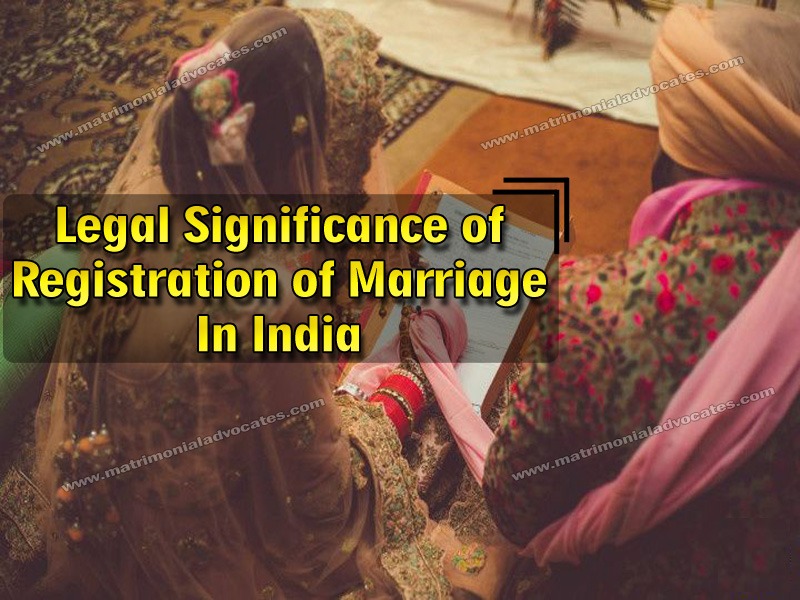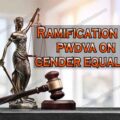
SIGNIFICANCE OF MARRIGE REGISTRATION IN INDIA AND COMMENTS ON
PROPOSED NRI COMPULSORY REGISTRAITON OF MARRIAGE BILL, 2019
Abstract:
Marriage is a socially and legally sanctioned Union, usually between a man and woman which is
regulated by law, customs, beliefs etc.1. By marriage both man and woman agree to undertake
rights and duties with respect to each other. However, with the increasing complexities of the
Indian Society and emerging technology and interconnection between people living in different
parts of the society novel issues have arisen in matrimonial legal domain. One of such issues is
Compulsory Registration of marriage in India and despite there being a strong agreement among
Courts, civil society and women organizations that it is the need of an hour to enact a central
legislation covering all the citizen within its domain irrespective of personal law so that the issues
like child marriages, practice of scrupulous denial of marriage etc. could be curved. Therefore, the
present article will describe and discuss the feasibility and need of compulsory marriage
registration in India with discussing the features of proposed Compulsory Registration of Marriage
of NRI, 2019 with the perspective of rights of the women.
Keywords: Marriage registration, Compulsory Registration of Marriage of NRI, Bill, 2019,
INTRODUCTION:
In India the Citizens are governed by their own respective personal laws when it comes of matters
relating and pertaining to marriage, divorce, maintenance, inheritance, succession etc. The
1 (marriage | Definition, History, Types, Customs, Laws, & Facts | Britannica) (Britannica.com,
2021)
Constitution of India, however put these matters under Concurrent List (List III) under item no.5
which says “ Marriage and divorce; infants and minors; adoption; wills, intestacy and
succession; joint family and partition; all matters in respect of which parties in judicial
proceedings were immediately before the commencement of this Constitution subject to their
personal law”. Thus, any enactment with respect to making provisions of compulsory marriage
registration can either be brought by the states legislator or by parliament, but experiences have
shown that there has been lack of enthusiasm among the parliamentarian or national policy making
to bring in forth any such law. Despite the aloofness of the central leadership, there are various
states such as Maharashtra, Gujrat, Himachal Pradesh and Karnataka, Delhi have brought law on
compulsory marriage registration making further provisions of fines and penalties in case of delay
or noncompliance.
The question arises as to why there is a need to bring a uniform and centralized law on compulsory
marriage registration, when these issues are already being governed by the personal laws of the
citizen. The answer could be found in the response affidavit given to Supreme Court of India by
the National Commission for Women in Smt. Seema Vs. Ashwani Kumar2 where the Commission
supported the proposal for legislation on compulsory marriage registration stating that the such
legislation would be helpful in dealing with the various issues relating to women such as:
prevention of Child marriages, forced marriages, curbing bigamy/polygamy, claiming
maintenance etc. Although Hindu Marriage Act under section 8 talks about the registration of
marriage but at the same time left it to the concerned states to make rules in this regard.
2 (Smt. Seema Vs. Ashwani Kumar, 2005), Transfer Petition 291 of 2005
Further, as this aspect primarily concerns married women and their various related issues cited
above, reference could be made to Article 15 (3) of the Constitution of India which is an enabling
provision giving a power to the State to make laws for Women and Children.
Having said that, unfortunately there have been very slow development despite directions given
by supreme Court of India in that case3 and it is only recently that the Parliamentary Panel has
approved the proposed bill on Compulsory Marriage Registration of NRI (Compulsory Marriage
Registration of NIR Bill, 2019) making it Compulsory for any NRI marrying an Indian Citizen to
register his marriage within 30 days of such marriage.
Ultimately this proposed law could be a first step in right direction towards creating a uniform
legislation on marriage registration in India as soon as possible.
Significance of Marriage Registration:
In India the registration of marriage has not been made compulsory uniformly and the parties are
free to register their marriage after performing the necessary ceremonies under their own
respective personal laws and it further vary from state to state. Furthermore, the parties to the
marriage may perform their civil marriage without opting for any religious ceremonies under
special marriage Act before the concerned marriage registrar. Having regard to the stated factum,
people hardly visit the registrar office for registration of their marriages as they don’t find it
necessary to do so, barring some exceptions (such as travelling on spouse visa). The Law
Commission of India in its 270th Report titled as Compulsory Registration of Marriage observed
in its introductory remarks that
“1.2 Instances of marriage fraud have also come to light in recent times. In the absence of
compulsory registration, women are duped into marrying without performance of the conditions
3 Supra.
of a valid marriage. This deprives women of societal recognition and legal security. Such
fraudulent marriages are especially on rise among nonresident Indians.4 Compulsory registration
can serve as a means to ensure that conditions of a valid marriage have been performed”
4. Thus, without sacrificing the plurality of practices, Customs and diversity of the Country in respect of
solemnization of marriage, it is desirable that a uniform law should be brough in.
The Compulsory Registration of Marriage of NRI Bill, 2019
The newly proposed law titled as “The Registration of Marriage NRI Bill, 2019 has recently been
approved by the Parliamentary Standing Committee. The bill seeks among other, to make
Compulsory provision with respect to the registration of marriage of NRI (The bill does not define
NRI what only states that NRI is a person who resides out of India) and further amend Passport
Act and provisions related to service of summons provided in Code of Criminal Procedure, 1972.
This bill has been sought to be enacted with lauded objective of protecting the exploited women
who are often deserted in India after marrying the NRIs or mistreated in foreign countries. In this
respect Standing Committee on external affairs5 noted that 5,298 complaints have been received
related to NRI marital grievances between the period of January, 2016 October, 2019 (Pandit,
2020). The proposed bill makes stringent provisions under which the passport of erring NRI can
be impounded/revoke and such person can also be declared proclaimed offender.
However, the committee expressed its reservations regarding impounding of the passport of the
errant person as there is already a provision for the same under various conditions and the provision
that where if it is brought to the notice of the passport authority that errant person has not registered
4 The Law Commission of India in its 270th Report titled as Compulsory Registration of Marriage
(India, 2017)
5(Introduction of Bill on NRI marriage in Rajya Sabha by external affairs minister, 2019)
his/her marriage withing the 30 days of solemnization of marriage seems disproportionate and a
stringent action which may be misused.
Salient Features of The Registration of Marriage of Non-Resident Indian Bill, (2019):
Mandatory Marriage Registration of NRI within 30 days:
a. Mandatory for every NRI who marries a Citizen of India to register his marriage registered
in India within 30 days from the date of marriage.
b. Marriage to be registered with the marriage officer appointed under section 3 of Foreign
Marriage, Act 1969 (in whose jurisdiction the marriage has taken place or solemnized)
Amendment to Passport Act, 1967
a. Seeks to insert a sub clause “I” after sub clause “h” in Section 10 (3)
b. Impounding or revoking of the passport of the errant NRI who fails to register his
marriage within 30 days of his marriage.
Amendment to Code of Criminal Procedure, 1973
a. Propose to insert sub-section 86A in the Cr.P.C with 6 sub clauses.
b. Clause -1: with respect to the summons of Service where the Court has been empowered
to issue summons by uploading the same on designated website (Bill does not give details
thereof) of Min. of Corporate Affairs and such uploading shall be taken as conclusive
service.
c. Clause -2: Provision of issuance of warrant of arrest and uploading the same on designated
website of Min. of Corporate Affairs in case where the person summoned failed to appear
before court after the step had been taken under clause -1.
d. Clause -3: Provisions to declare a person proclaimed offender and uploading the
declaration thereof to the designated website of Min. of Corporate Affairs in case where
the person fails to appear before Court after the step had been taken under clause-2.
e. Clause-4: Statement of the Court that proclamation was duly uploaded on the specifically
designated website of Min. of Corporate Affairs which shall be conclusive evidence that
the warrant was issued against the accused and the same shall be deemed to have been duly
served.
f. Clause -5: Power of the Court after issuance of proclamation to attached any property
belonging to the proclaimed offender. Here Court has to record its reasons.
g. Clause-6: In case of Joint property (s) under attachment, the effect of such attached as give
under clause-5 would only upto the share or interest of the proclaimed offender in such
property.
The said provisions of the proposed Bill, seem stringent enough to provide adequate deterrence to
the errant NRIs doing mischief to their spouses by concealing their whereabouts in foreign
countries and avoid the process of Indian Courts and there is no doubt the legislation would entail
various benefits to the parties to marriage and specially for women to claim their rights arising out
of marriage when their spouses deny the validity of marriage taking advantage of lack of valid
ceremonies etc.. Although the registration of marriage cannot be a conclusive proof of
solemnization of marriage but it would provide a valid presumption in favor of the party asserting
the factum thereof.





